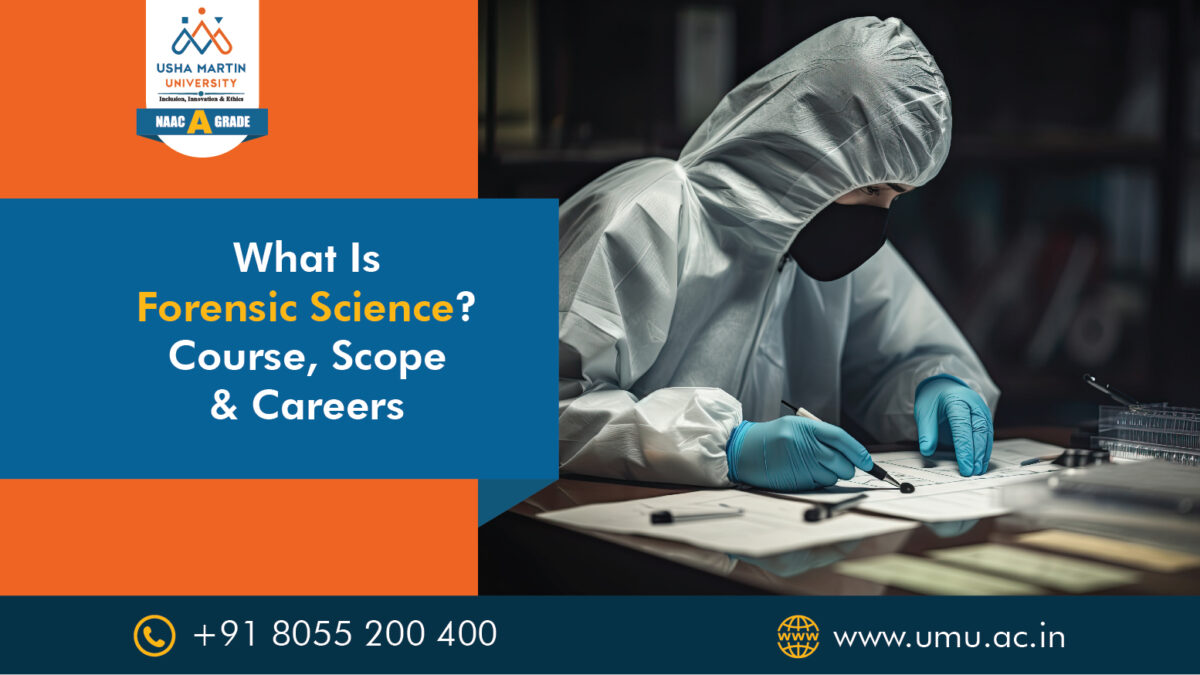
Bihar Student Credit Card Scheme – Eligibility Criteria & Admission Guide
June 23, 2025
What is BTech Course? Everything You Need to Know About the Engineering Degree
June 25, 2025What is a Forensic Science Course?
A forensic science course is an academic program that teaches students how to apply scientific principles and techniques to investigate crimes and support the justice system. The curriculum typically covers the fundamentals of forensic science, including its history, scope, and the role it plays in crime scene investigation and legal proceedings.
Introduction to Forensic Science Course at Usha Martin University
Usha Martin University (UMU) offers a comprehensive three-year bsc forensic science designed to bridge theoretical knowledge with practical application in the field of criminal investigation and justice. This undergraduate program, developed by forensic science experts and academicians, equips students with the scientific principles, technical acumen, and sharp observational skills needed to assist law enforcement agencies in solving crimes efficiently.
The BSc Forensic Science covers a multidisciplinary curriculum, including criminology, forensic biology, crime scene investigation, trace evidence analysis, applied physical and forensic chemistry, forensic physics, DNA fingerprinting, forensic toxicology, ballistics, psychology, and questioned document analysis. Students gain hands-on experience through access to modern laboratories and real-world forensic tools, ensuring they are well prepared for professional challenges.
Course Structure and Duration for Forensic Science Course
UMU offers a comprehensive BSc Forensic Science as a full-time undergraduate course with a duration of 3 years. The course is structured to provide a blend of theoretical knowledge and practical skills, preparing students for careers in forensic investigation and allied fields. Students receive hands-on training in modern laboratories, focusing on real-world forensic applications and evidence analysis.
The core subjects included are criminology, forensic biology, crime scene investigation, trace evidence analysis, applied physical and forensic chemistry, forensic physics, DNA fingerprinting, forensic toxicology, ballistics, psychology, and questioned document analysis. Each semester integrates classroom lectures with laboratory sessions, ensuring hands-on experience with modern forensic tools and techniques. The program also emphasizes professional communication and environmental science and includes a dissertation project in the final semester, preparing students for real-world challenges.
Eligibility Criteria for Forensic Science Admission
The candidates who have cleared Class 12 in the science stream from a recognized board can only apply. They need to have 50% marks in class 12. These eligibility criteria form the basis of the selection process.
Have any queries related to our courses? Visit our website https://www.umu.ac.in/ to raise your questions. Our team is here to provide solutions, guide you through the admission process, and assist you with any course-related enquiries.
Admission Process for Forensic Science Course 2026-27
The candidates who wish to pursue the course first need to apply to the course either online or offline. For the online way, they need to visit the official website, fill out the application form, upload the necessary documents, and pay the application fee online. And for those who wish to apply offline, they need to collect the form from the university campus, fill it out and send it along with the Xerox copies of the necessary documents and DD of the application fee.
The selections of the candidates are done on the basis of the merit of the qualifying exam (12th). Those who are selected have an admission offer sent. On receipt of the admission offer, the candidates need to pay the prescribed fee of Rs 445000 and complete the joining formalities to secure their seat for the course.
Why Choose Usha Martin University for a Forensic Science Course?
- Comprehensive Curriculum – Usha Martin University’s BSc Forensic Science course offers an in-depth curriculum covering key areas like toxicology, criminology, digital forensics, DNA analysis, forensic psychology, and more, ensuring students gain both theoretical and practical expertise.
- Emphasis on Practical Training – The course is designed with a strong focus on hands-on learning through modern laboratory facilities and crime scene simulations, preparing students for real-world forensic challenges.
- 100% Placement Support – UMU provides robust placement assistance, including personalized career counselling, industry tie-ups, and regular campus recruitment drives, helping students secure promising roles in forensic labs, law enforcement, and legal firms.
- Modern Infrastructure – Students have access to state-of-the-art laboratories and equipment, creating an optimal environment for learning advanced forensic science techniques.
- Affordable Fee Structure – The university offers a competitive and transparent fee structure, making quality forensic science education accessible without financial strain.
- Multidisciplinary Approach – The BSc Forensic Science integrates scientific knowledge with investigative techniques, offering specializations and electives that allow students to tailor their education to their interests and career goals.
Start Your Forensic Science Journey Apply for BSc Forensic Science | Usha Martin University
Career Scope and Job Opportunities After the Forensic Science Course
A degree in forensic sciences opens diverse and rewarding career paths in both government and private sectors. Students are in demand across law enforcement agencies, forensic laboratories, investigative agencies, legal consultancies, and even media organizations.
The key job roles included are
- Forensic Scientist – A forensic scientist is a highly trained professional who applies scientific methods to examine and analyze evidence from crime scenes, supporting criminal investigations and the justice system.
- Crime Scene Investigator/Analyst/Technician – Crime scene investigators (CSIs), analysts, and technicians are vital professionals in the criminal justice system, specializing in the meticulous examination, documentation, and analysis of crime scenes and evidence.
- Medical Examiner – A medical examiner is a licensed physician, often specialized in forensic pathology, who investigates deaths occurring under unusual, suspicious, or unexplained circumstances.
- Investigation Officer – An Investigation Officer in forensic science, plays a pivotal role in the criminal justice system by applying scientific methods to uncover facts and solve crimes.
- Drug Analyst – A drug analyst in forensic science specializes in identifying and quantifying drugs, poisons, and other chemical substances found in biological samples, crime scene evidence, or seized materials.
- Cyber Forensic Expert – A cyber forensic expert, also known as a computer or digital forensic investigator, specializes in uncovering, analyzing, and preserving digital evidence related to cybercrimes and security breaches.
- DNA Analyst – A DNA analyst is a scientist responsible for analyzing DNA evidence collected from crime scenes to assist in criminal investigations and legal proceedings.
- Ballistics Expert – A ballistics expert is a forensic science specialist who analyzes firearms, ammunition, and ballistic evidence to help solve crimes involving guns.
- Forensic Toxicologist – A forensic toxicologist is a scientific specialist who analyzes biological samples—such as blood, urine, and tissues—to detect and identify drugs, alcohol, poisons, and other toxic substances.
Conclusion
Forensic science stands at the intersection of science, law, and justice, offering a dynamic and impactful career path for those passionate about investigation and problem solving. As crime rates rise and technology evolves, the demand for skilled forensic experts continues to grow across police departments, investigative agencies, laboratories, and the legal system. The field’s multidisciplinary nature—encompassing biology, chemistry, digital forensics, toxicology, ballistics, and more—ensures a wide array of specializations and opportunities for advancement.
Usha Martin University empowers aspiring forensic scientists with a robust curriculum, state-of-the-art laboratories, and hands-on training that align with industry needs. By choosing UMU for BSc Forensic Science, students gain not only scientific expertise but also the ethical, analytical, and communication skills essential for success in this vital profession. Students are well-prepared to contribute meaningfully to the justice system, whether in public or private sectors, and to build rewarding careers that make a real difference in society.
Admissions are open for forensic science course at Usha Martin University! Join a three-year, industry-focused program with expert faculty, hands-on training, and state-of-the-art labs. Shape your future in crime investigation and forensic analysis—apply now to start your journey in this dynamic field at UMU!
Frequently Asked Questions (FAQs)
Q1: Is there an entrance exam for admission?
Admission is generally merit-based.
Q2: What subjects are covered in the curriculum?
The course covers key areas like toxicology, criminology, digital forensics, DNA analysis, forensic psychology, and more.
Q3: What practical exposure will I get?
Students benefit from hands-on training in modern forensic labs, crime scene simulations, field trips, and more.
Q4: What are the career prospects after graduation?
Students can pursue careers in forensic labs, law enforcement, research institutions, private investigation firms, cybersecurity companies, and intelligence agencies.
Q5: How do I apply for the course?
You can apply both online and offline.




